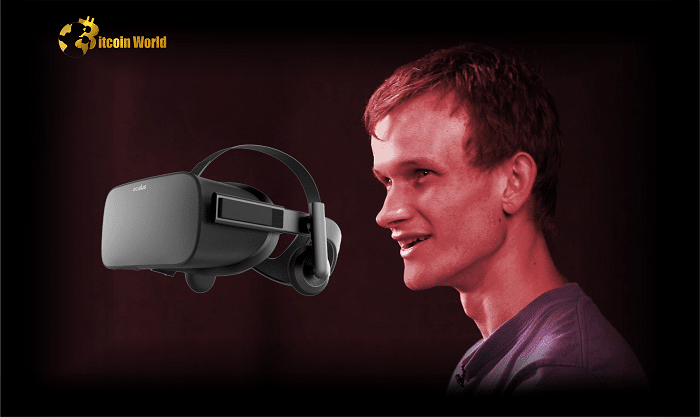In the ever-evolving landscape of technology, even the brightest minds occasionally voice skepticism. Recently, Vitalik Buterin, the influential co-founder of Ethereum, sparked a debate with a tweet questioning the inherent value of virtual reality (VR). Coming at a time when tech giants like Meta are heavily invested in the metaverse, Buterin’s perspective offers a critical counterpoint. Is he right to be wary? Let’s dive in.
Vitalik’s VR Verdict: More Than Just Novelty Needed?
Buterin’s tweet, while concise, resonated with many. He argues that “VR for the sake of VR” is unlikely to achieve widespread success. This sentiment echoes concerns often raised by cryptocurrency skeptics – that technology needs tangible utility to thrive. He isn’t dismissing VR entirely; rather, he emphasizes the need for compelling, real-world applications. Just like crypto, VR needs to solve problems and offer genuine value beyond the initial excitement.
VR for the sake of VR will not succeed. The same applies to crypto.
— vitalik.eth (@VitalikButerin) October 28, 2022
Meta’s Metaverse Mishaps: A Case Study in Premature VR Investment?
Buterin’s comments arrive at a particularly sensitive time for Meta (formerly Facebook). The company’s recent quarterly results painted a bleak picture, with a significant 25% drop in stock value. This downturn is largely attributed to the massive investment in its metaverse division, Reality Labs, which reported a staggering $9.4 billion loss. While unfavorable economic conditions have impacted the tech industry broadly, Meta’s heavy bet on the metaverse seems to be exacerbating its financial woes.
Consider these key points regarding Meta’s current situation:
- Sales Decline: Meta reported its second consecutive quarterly sales decline, with predictions of a further dip in the upcoming quarter.
- Investor Anxiety: Investors are increasingly concerned about the profitability and timeline of Meta’s metaverse investments.
- Zuckerberg’s Optimism vs. Reality: Despite the significant losses, CEO Mark Zuckerberg remains optimistic about the company’s direction, a sentiment not entirely shared by investors.
The stark contrast between Zuckerberg’s optimism and the financial realities has led some analysts to view Meta’s metaverse venture as a misstep, potentially accelerating the company’s decline. The personal wealth of Zuckerberg himself has taken a significant hit, dropping by over $11 billion in a single day.
Is This the End for the Metaverse Dream?
While Meta’s current struggles are undeniable, does this signify the failure of the entire metaverse concept or the broader potential of VR? Not necessarily. Buterin’s critique highlights the importance of purpose-driven development. Investing billions in a virtual world without clear, compelling use cases for the average user is a risky proposition.
Where Does VR Truly Shine? Beyond the Hype.
So, if “VR for the sake of VR” is questionable, where does the real value lie? Here are some areas where VR is already making a significant impact and holds immense potential:
- Training and Simulation: VR provides immersive and safe environments for training in high-risk professions like surgery, aviation, and military operations. Imagine practicing complex procedures repeatedly without real-world consequences.
- Education: VR can transport students to historical events, the surface of Mars, or inside the human body, making learning more engaging and memorable. Think virtual field trips that transcend geographical limitations.
- Healthcare: Beyond training, VR is used for pain management, physical therapy, and exposure therapy for conditions like PTSD. The immersive nature of VR can distract from pain and create controlled environments for therapeutic interventions.
- Design and Engineering: Architects, engineers, and designers can visualize and interact with their creations in 3D before physical prototypes are built, saving time and resources.
- Remote Collaboration: While still developing, VR offers the potential for more immersive and engaging remote meetings and collaborations, going beyond traditional video conferencing.
The Challenges on the Horizon: Why Isn’t VR Mainstream Yet?
Despite the promising applications, VR faces several hurdles hindering its widespread adoption:
| Challenge | Description |
|---|---|
| Cost of Hardware | High-quality VR headsets and accessories can be expensive, creating a barrier to entry for many consumers. |
| Technical Limitations | Issues like motion sickness, clunky hardware, and limited field of view can detract from the immersive experience. |
| Lack of Killer Apps | While there are interesting VR experiences, a truly compelling, must-have application for the average user is still lacking. |
| Social Acceptance | The social norms and etiquette surrounding VR interaction are still evolving, and some find the technology isolating. |
Actionable Insights: Navigating the VR Landscape
So, what can we learn from Buterin’s skepticism and Meta’s current predicament?
- Focus on Utility: For VR to succeed, development must prioritize practical applications and solve real-world problems.
- Gradual Adoption: Rushing into massive, expensive metaverse projects without proven demand is a risky strategy. A more phased approach may be wiser.
- User Experience is Key: Addressing technical limitations and improving user comfort are crucial for broader adoption.
- Community and Connection: VR experiences should foster genuine connection and community, rather than feeling isolating.
The Future of VR: A Marathon, Not a Sprint
Vitalik Buterin’s perspective serves as a valuable reminder that technological innovation requires more than just novelty. While Meta’s current struggles highlight the risks of premature and unfocused investment in the metaverse, the underlying potential of VR remains significant. By focusing on practical applications, addressing technical challenges, and prioritizing user experience, VR can move beyond the hype and become a truly transformative technology. The journey may be a marathon, not a sprint, but the destination could be well worth the effort.
Disclaimer: The information provided is not trading advice, Bitcoinworld.co.in holds no liability for any investments made based on the information provided on this page. We strongly recommend independent research and/or consultation with a qualified professional before making any investment decisions.


